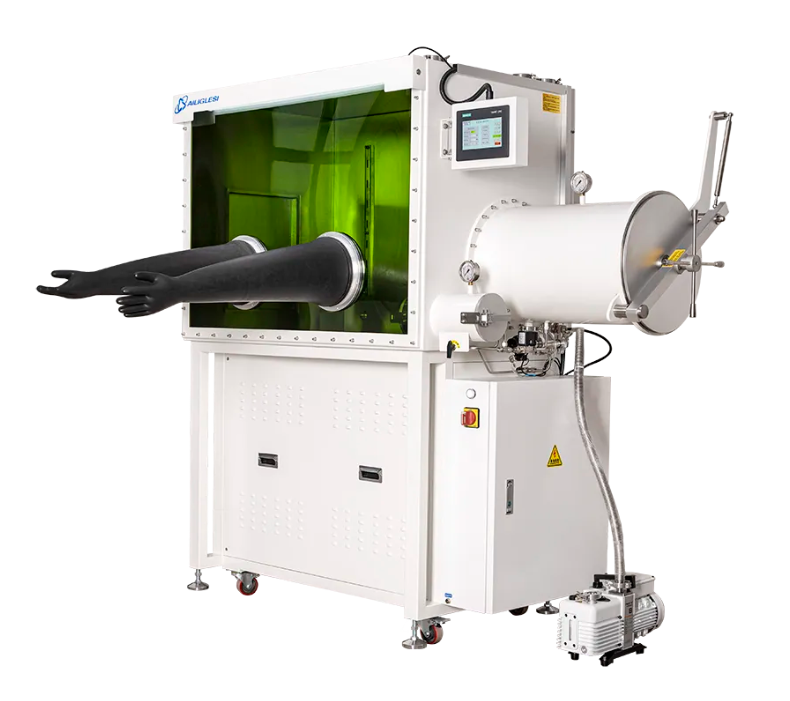How Glove box Airtightness Enhances Operational Efficiency
Preventing Contamination in Sensitive Environments
Airtightness in glove boxes is crucial for preventing contamination from airborne particles and preserving the integrity of sensitive materials. This is especially important in industries like pharmaceuticals and electronics where product quality can significantly suffer from contamination. Facilities adhering to stringent airtightness standards typically achieve at least a 30% reduction in contamination events compared to those with less rigorous protocols. For example, a study in pharmaceutical environments highlighted that proper airtight systems could effectively safeguard delicate compounds from external contaminants. Implementing robust airtight standards ensures a protective barrier that minimizes the risk of external pollutants affecting sensitive operations.
Minimizing Gas Loss and Maintaining Inert Conditions
Maintaining an inert atmosphere within glove boxes is vital for processes sensitive to oxidative degradation. Even minor gas losses can compromise these conditions, leading to material degradation. Research has shown that inadequate airtight seals in glove boxes may result in undesirable reactions or spoilage of materials stored within. Therefore, ensuring impeccable airtight seals is imperative. Regular monitoring of the gas composition is another critical aspect that supports the maintenance of inert conditions, thus enhancing operational efficiency. By systematically checking gas levels, laboratories and industrial setups can ensure ongoing protection against environmental shifts that could affect sensitive materials.
Filtration System Performance's Impact on Workflow
Removing Particulates for Uninterrupted Processes
Effective filtration systems are essential to maintaining a smooth workflow by removing particulates and reducing downtime. In industrial settings, particulates can accumulate, necessitating frequent cleaning and maintenance interventions, which disrupt operations. Advanced filtration systems are designed to efficiently capture these particles, minimizing interruptions. Recent studies have revealed that businesses leveraging such systems can see productivity boosts of up to 20%. This statistic underscores the value of investing in high-performance filtration solutions. Additionally, to sustain this level of efficiency, it's crucial that maintenance of the filtration units is regularly performed. Such upkeep ensures that the system continues to capture particulates optimally without causing unexpected downtimes.
Maintaining Purity Standards in Critical Applications
In industries with stringent purity requirements, proper filtration is vital for maintaining compliance and operational excellence. Different sectors, especially those dealing with sensitive materials such as pharmaceuticals and electronics, have particular purity standards that need adherence. According to experts in the field, failure to uphold these standards can result in significant financial losses and even damage to reputational capital. Ensuring that filtration systems are up to par mitigates these risks, safeguarding product integrity and process efficiency. Implementing streamlined filtration solutions not only shores up compliance efforts but also fortifies against potential purity issues, hence strengthening overall operational performance. Maintaining such high standards is vital to meet the industry's demands and protect against potential setbacks.
The Synergy Between Airtight Seals and Advanced Filtration
Dual Protection Against Environmental Contaminants
Combining airtight seals with advanced filtration systems provides comprehensive protection against environmental contaminants. This synergy is crucial for minimizing contamination risks in sensitive applications. Statistics suggest that implementing these dual protection strategies can reduce overall contamination risks by up to 40%. The collaboration between seal integrity and filtration capabilities ensures seamless operational efficiency, particularly in industries where purity and precision are paramount.
Energy Efficiency Through Optimized System Design
Optimized system design in filtration systems and airtight seals can significantly enhance energy efficiency. Research indicates that businesses can reduce energy costs by 15-25% by adopting improved design strategies. Not only do these efficient systems lower overheads, but they also contribute to a reduced environmental footprint, aligning operations with sustainability goals. With the growing importance of eco-friendly practices, such energy optimization is beneficial in maintaining industry competitiveness while contributing positively to the environment.
Sustaining Efficiency Through Proper Maintenance Practices
Regular Leak Testing Protocols
Implementing routine leak testing is an essential practice for maintaining the integrity of glove boxes. Regular testing can identify vulnerabilities that may compromise performance. Data suggests that consistent leak testing can extend the lifespan of glove boxes by as much as 30%, thereby enhancing overall operational efficiency. These protocols should include both visual inspections and pressure testing to ensure thorough evaluations. By addressing potential leaks early, businesses can prevent the costly consequences of compromised glove box integrity.
Filter Replacement Cycles and Performance Monitoring
Establishing precise filter replacement cycles is crucial for maintaining efficient filtration performance. By basing these cycles on usage patterns, glove boxes can ensure continuous efficiency. Monitoring filter performance through indicators provides an early warning system that signals the need for replacements, preventing dips in efficiency. Studies have shown that neglecting filter maintenance can lead to a 20% decrease in overall system performance, emphasizing the importance of regular checks. By staying on top of these maintenance tasks, operations can maintain peak efficiency and avoid unforeseen disruptions.
FAQ Section
Why is airtightness important in glove boxes?
Airtightness is crucial for preventing contamination of sensitive materials and maintaining the quality and integrity of Products in industries such as pharmaceuticals and electronics.
How does proper filtration impact operational efficiency?
Effective filtration systems help remove particulates, reducing downtime and enhancing workflow productivity by up to 20%.
What benefits do airtight seals combined with filtration systems offer?
Combining airtight seals with filtration systems provides dual protection against environmental contaminants, reducing contamination risks and ensuring seamless operational efficiency.
How can energy efficiency be enhanced through system design?
Optimized system designs in filtration and airtightness can reduce energy costs by 15-25%, lower overheads, and align operations with sustainability goals.
What maintenance practices sustain efficiency in glove boxes?
Regular leak testing helps maintain integrity, and precise filter replacement cycles ensure ongoing efficiency, preventing disruptions and extending glove box lifespan.


